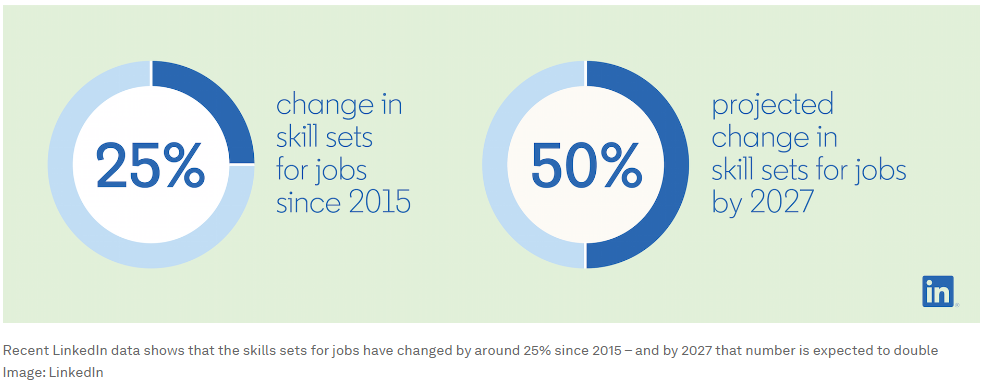If you’re not continuously learning new skills, you could become obsolete quicker than you might think. Whether you want to change jobs or prepare for the next-level role, the most important thing to know about upskilling is that every employee needs to be doing it all the time. Jobs are changing as business demands change, and employees are expected to prove their value with increasingly higher expectations.

Talent is not a finite resource. It can be expanded and built upon, just like anything else. Having the right mindset and a willingness to grow makes all the difference to fully developing your own talent and potential. Employees with a growth mindset are always looking for opportunities to develop, regardless of past achievements. Pushing yourself toward continual growth will inevitably open up new opportunities, even if you have occasional setbacks. It’s all part of the learning curve.
There are plenty of ways to educate yourself and upskill without going back for a traditional undergraduate or graduate degree. Here are five ways to upskill without going back to school.
Professional Development Courses – While taking individual classes may not seem comparable to a four-year degree, showing you’re continuously learning and growing your skills is an attractive quality in an employee. Duke makes it easy to reach your professional development goals with courses available through Learning & Organization Development on a variety of topics. As well, there are hundreds of courses and learning pathways available through Duke’s partnership with LinkedIn Learning.
Staying Abreast of Emerging Technology and Trends – Follow social media accounts or subscribe to email newsletters created by experts in your industry. Start by following the most prominent companies and individuals in your sector and embrace the rabbit hold of learning as you discover increasingly niche content. Attending industry events takes in one step further by providing networking and educational opportunities.
Stretch Assignments – Make a habit of seeking out stretch assignments that teach you new or higher-level skills while also challenging you to demonstrate those skills. Even if the project isn’t highly visible, at least the person who gave you the opportunity will know what you can achieve. The goal is to continue to upskill so you can be considered for the next opportunity.
Mentorships – The right mentor will provide new perspectives on your work and how to uplevel your skills and challenge you to think differently. If you find a mentor who is a senior leader in your organization, they’ll have deeper knowledge of the company’s growth trajectory and what capabilities will be needed as the company grows or shifts strategy.
Certifications – Many careers offer certifications to prove you have both a baseline understanding of what’s required in a job or a mastery of best practices in a certain field. For example, the Project Management Institute offers a PMP certification for project managers, Product School offers product management certifications, SHRM and HRCI offer HR certifications, the Financial Management Association offers finance certifications, and so on. Certifications show you have knowledge and capabilities in a certain field, which makes them especially important if you’re transitioning careers and don’t have a lot of work experience in the new field.
Your next challenge awaits you. Don’t be caught behind when you can uplevel your skills to move ahead. Start taking baby steps now so you can thank yourself five years down the line.
References:
Harvard Business Review (2022, December 5) Marlo Lyons: 5 Ways to Acquire New Skills Without Going Back to School
Forbes (2021, August 24) Tim Madden: Six Ways to UpSkill and Adapt in Your Career
Entrepreneur (2022, June 6) Michelle Arieta: How to Advance Your Career Through Upskilling and Reskilling in Your Current Role

Leave a Reply